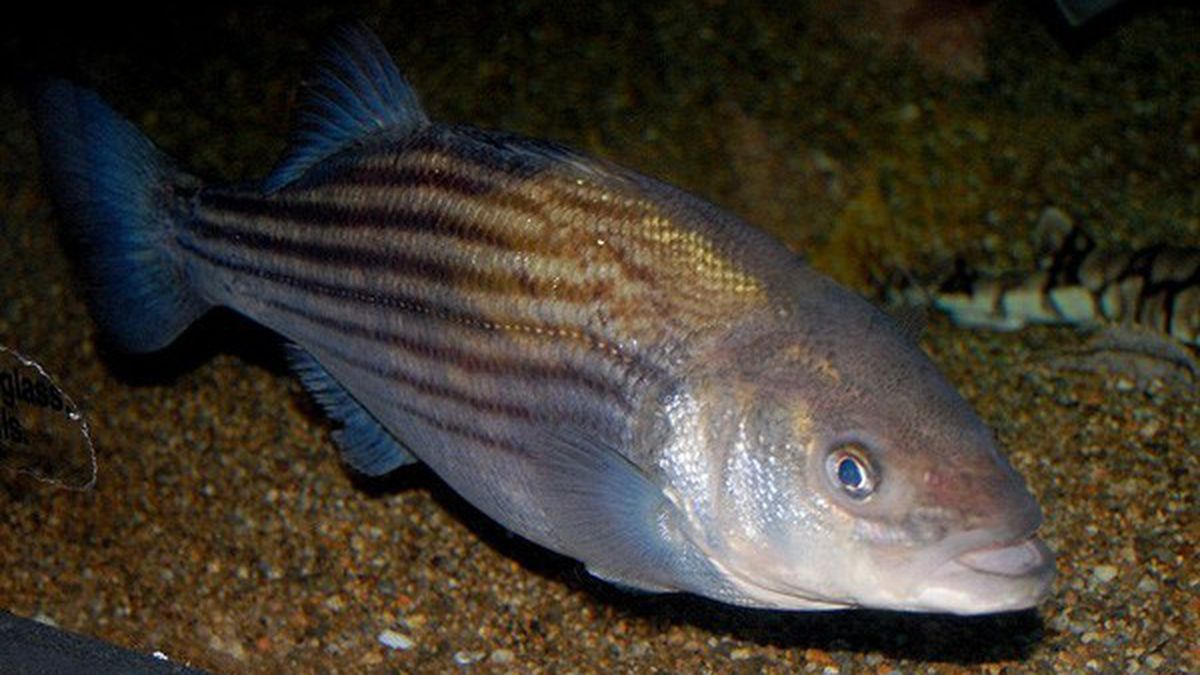For years, the California Department of Fish and Game has managed and protected striped bass in the delta even though it’s a nonnative species that eats an endangered one — namely, the winter-run Chinook salmon. But a three-year court battle could result in a decision this week that would loosen protections on California’s striped bass and open it up to more fishing. The group behind the lawsuit argues that such a move could restore declining salmon populations, but many environmentalists are suspicious. They believe the real reason for the lawsuit is about securing more water for big agribusiness.
The federal court lawsuit was brought by the Coalition for a Sustainable Delta. This group, made up of water users and farmers in the San Joaquin Valley, argues that striped bass are eating Chinook salmon toward extinction, and that bass — not the diversion of water to farms — are the primary reason for why the once tremendous commercial fall-run of Chinook in the Sacramento River has experienced a precipitous decline in recent years. “Does it make sense that we protect a nonnative species at the expense of a native one?” asked Michael Boccadoro, spokesman for the Coalition for a Sustainable Delta.
But numerous biologists, conservationists, and fishermen contend that there is no conclusive evidence that bass are the prime cause of the salmon’s decline. And they note that the coalition is supported by agricultural interests, which also have fought against federal and state laws that protect salmon. “These people want more water,” said Jim Cox, a sport fishing guide in Bay Point and president of the West Delta Chapter of the California Striped Bass Association. “They’re desperate to blame the drop in salmon on something other than too much water being pumped south.”
San Joaquin Valley farmers rely on generous diversions of the Sacramento River’s water to irrigate their fields and orchards. Water is sent their way via two large pumps near Stockton. Biologists have found these pumps to kill large numbers of fish, including salmon, and have named them as the leading cause for the Sacramento River salmon collapse.
The volume of water pumped out of the Sacramento/San Joaquin River Delta has grown substantially in the past two decades. Almost simultaneously, delta fish populations have plummeted to all-time lows. According to numbers from the California Department of Water Resources and federal fishery agencies, less than three million acre feet of water left the delta through the pumps in 1992. That rate has crept upward over the years, and in 2005, 6.8 million acre feet of water was pumped out of the delta. Between 2002 and 2005 alone, pumping rates increased by 28 percent. In 2008, biologists observed the lowest return of fall-run Chinook salmon ever in the Sacramento, 66,000 fish, down from 800,000 in 2002. In 2009, just 39,000 returned. Presumably, huge numbers of juveniles perished in 2005 and 2006, resulting in the absence of adults in the following years.
But Boccadoro, spokesman for the Coalition for a Sustainable Delta, contends that pumps are just one of many “stressors” and that striped bass are of equal detriment to salmon. To cull numbers of striped bass, the coalition wants the state to eliminate the two-fish daily bag limit and 18-inch minimum-size limit that striped bass fishermen currently must observe.
But the striped bass population is hardly a vigorous one itself, and its numbers have plunged from prior levels. In December, results from the Department of Fish and Game’s annual “midwater trawl survey,” conducted each fall to provide a snapshot of species abundance, found six species, including delta smelt and striped bass, to be hovering at their lowest levels ever observed in the annual sampling. “All the evidence that I’ve seen indicates that when striper numbers go up, so do salmon numbers, and when striper numbers go down, so do salmon numbers,” said Sacramento attorney Mike Jackson, who represents several interveners in the coalition’s lawsuit. “There’s no question that stripers eat salmon smolts in the spring, but they’ve been doing that since 1879” — the year striped bass were introduced to California. The two species, he says, coexisted for more than a century before their numbers began to decline.
Peter Moyle, a UC Davis professor of fish biology, suspects the anti-striped bass campaign to be a ploy. In a January 31 entry at CaliforniaWaterBlog.com he wrote, “Reducing striped bass and other predator populations is unlikely to make a difference in saving endangered fishes, and will serve only to distract attention from the real problems.” In an interview for this story, Moyle said the “best solution” for stabilizing fish numbers would be to shut off the delta pumps. If such action is not feasible, though, then the “second best solution,” he said, would be to remove water from the system via alternate means. Moyle believes the much-discussed and controversial “peripheral canal,” if installed well upstream of the delta and maintained cautiously “with ironclad guarantees” that the amount of water exported would never increase, could save the ecosystem.
At March 17 at a hearing in Fresno, US District Judge Oliver Wanger could approve a proposed settlement in the coalition’s lawsuit that would require the Fish and Game Commission to rewrite — and presumably weaken or eliminate — the sport fishing regulations on striped bass. State legislation sponsored by groups of water users intended to do the same has already failed twice in the past two years.
“The coalition just wants to get rid of stripers for now, and then they’ll turn to something else,” Cox said. Ignoring more fundamental problems in the ecosystem, he argued, will lead to the decline of still more species. “Then, maybe ten years in the future, there will be nothing left worth protecting in the delta, and then they could go ahead and take all the water they want.”














